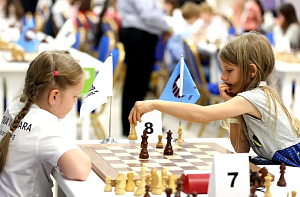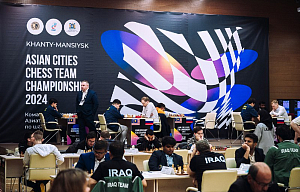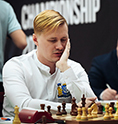16 May 2015
Sonnet of the Cuban poet
Vladimir Barsky reports on the second round of the FIDE Grand Prix.
Giri - Karjakin, draw
White chose quite modest variation, having moved a hard battle to the middlegame. Giri admitted: "In this opening line White equals, but he hardly can hope for more. Black has a comfortable position".
In the forthcoming game the Dutch grandmaster tried to expand the attack on the kingside, however he was not accurate and missed a strong opponent's idea, related to the pawn exchange on e4 followed by placing a knight on c4, and bishop on c6. Sergey Karjakin: "Too bad that I lost a lot of time on these moves, about 20 minutes; that was my mistake". Really, in the endgame Black suffered from the serious shortage of time needed for the calculations, it leaved a mark on the chosen decisions.
Apparently the position remained close to the equal, but the passive defense was not good enough for White. "Relatively soon Black got a time pressure, that's why I decided to search for the counterplay" (Giri). Anish was sure, that after all complications followed 30…Qc7 with queens' exchange and drawn endgame, however Black had at his disposal a strong move 30…Qxa2! with serious chances to win.
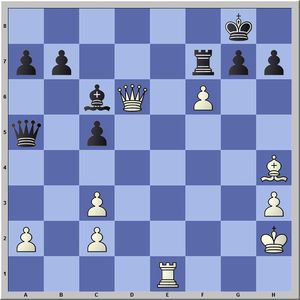
“I saw this capture, but with three minutes left I didn't want to risk playing it", concluded Sergey Karjakin.
Svidler - Caruana, draw
Playing neat the Russian grandmaster gained a serious advantage, but then he made a curious mistake and lost all of his advantage in one move.
Peter Svidler: "I hoped my opponent would choose the Grunfeld Defense, but in the Lasker System I was able to attain something too. I didn't expect to have such an attractive position, and when I got it, I should have handled it with greater care."
Svidler admitted that he was surprised by the move 18…Rc8, instead of this he was waiting for 18…Qg5 with a very hard and complicated fight. Fabiano Caruana explained his choice in a little bit mysterious phrase: "Oh, there were so many interesting opportunities here ..."
White stabilized the position, having fixed opponent's pawn weaknesses on the queenside. However, at that moment, when the slow stepping up of a pressure was possible, there followed a hasty break in the center, after with the sides made peace.
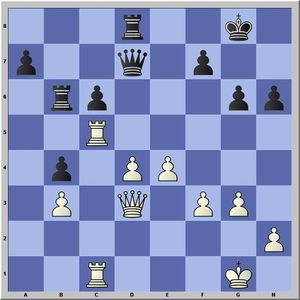
Here White played 34.d5?
Svidler pointed out that he thought 33…Rd8 loses by force just because of 34.d5, “and 34…cxd5 is not possible in view of 35.Rxd5, winning the rook d8”. He completely lost sight of the interposition 35…Rd6.
Domínguez - Jakovenko, 1-0
The first move d2-d4 made by Leinier Domínguez was quite surprising for his opponent: for many years the Cuban grandmaster has started the game only with the king's pawn move, and 1.d4 has been added to his opening repertoire not long ago. In the opening line, containing ideas of the Slav Defense and Catalan System, White prepared an interesting exchange sacrifice, having got a mighty passed pawn on d6 as a compensation.
The Russian grandmaster spent a lot of time to avoid the opponent's home preparation, and from all appearances he managed to perplex him with 18…Nd4 – after this move already Domínguez spent a lot of time thinking. "I thought after 18…Nd4 White had a better position, but didn't see how it went exactly" (Jakovenko).
Dmitry Jakovenko and Lenier Dominguez
Black occupied the open c-file, his queen invaded the opponent's territory, getting good counterchances. However, on the next move Jakovenko made a serious mistake: "I missed 26.Kf2; after that I didn't see how to move".
Having protected his king, White continued to attack in the center and using a bad coordination of black pieces, he got a decisive advantage soon.
Gelfand - Nakamura, draw
In answer to the King's Indian Defense Boris Gelfand chose the so called Bayonet system, which he had played a few times including recent events. Relocating the knight through g5 on e6, White accomplished a standard for this variation pawn sacrifice, having been checked in the famous Fischer-Taimanov match. "White has enough compensation for a pawn, but Black has a simple and clear play", said Gelfand at the press-conference.
Using strength of his fianchetto bishop g2, which has no opponent, White tried to expand the pressure along white squares in the center and on the queenside. But then, according to Boris, he miscalculated the evaluation of complications, arising in the most principal line, as the result he was obliged to defend the endgame without a pawn. Hikaru Nakamura carefully searched for winning opportunities, but opposite-colored bishops and a small quantity of pieces on the board allowed Gelfand to reach a draw without special troubles.
Hikaru Nakamura and Boris Gelfand
Vachier-Lagrave - Jobava, draw
A real thriller, one of the brightest games of the day! Both grandmasters were fighting with complete openness, ingeniously looking for tactical resources.
The opponents played the line of the Caro-Kann Defense with 3.е5, where Baadur Jobava implemented his favorite maneuver, related to the break f7-f6 and the following exchange on е5. The French grandmaster bravely moved his pawns off the king, fixed the knight on d6 and prepared for the final storm. However by means of a "pendular" bishop's maneuver g6-e8-c6-e8-g6 Black for a long time held his defensive position.
To continue the attack, Maxime Vachier-Lagrave sacrificed a pawn, getting a mighty passed pawn for it. At the press conference the grandmasters evaluated the arisen complications differently: Maxime thought that White's position is almost won, and Baadur skillfully found more and more defensive resources.
Without any doubt, Black's position was very extreme, but Vachier-Lagrave didn't manage to gain a decisive advantage, and on the 43rd move the game was drawn.
Tomashevsky - Grischuk, draw
The longest and most dramatic game of the day. The grandmasters continued the theoretical fight in the King's Indian Defense, which has been started at the previous stage of the FIDE Grand Prix in Tbilisi, which Evgeny spectacularly won. Now Evgeny gained a serious opening advantage, leaving Black almost without a counterplay.
White attacked with inspiration, not paying attention on material: he offered an exchange sacrifice on c6, then sacrificed a piece on f4. Black's defense seemed to crush at some point, however, one move before the time control, when White's attack was already extremely intense, Tomashevsky suddenly exchanged queens, having released the Black's king.
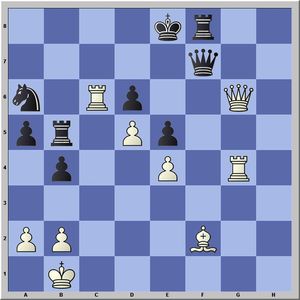
Of course, the appearing endgame was not safe for Black too, but Alexander Grischuk demonstrated obstinacy in defense and achieved a draw.
Evgeny Tomashevsky: “Yesterday I got extremely lucky – I was able to win, but today... It is hard to explain clearly, why I didn’t win. On the 39th move perhaps each move led to win. But I decided to calculate some variants and suddenly saw, that I had only 4 seconds, after which I made the first available move. And after the queens' exchange it seems to be a draw.”
Alexander Grischuk: “One can’t write sonnets, and I can’t play the King's Indian. Truly speaking, I can’t write sonnets either.”
Photos by M. Emelianova













